| Listing 1 - 8 of 8 |
Sort by
|
Book
ISBN: 1283599635 0742566455 9780742566439 0742566439 9780742566446 0742566447 9780742566453 9781283599634 Year: 2012 Publisher: Lanham Rowman & Littlefield Publishers
Abstract | Keywords | Export | Availability | Bookmark
 Loading...
Loading...Choose an application
- Reference Manager
- EndNote
- RefWorks (Direct export to RefWorks)
Gendered Justice takes a unique, multi-layered look at the various elements that factor into our understanding of domestic violence and how the criminal justice system handles situations of domestic violence. The book focuses primarily on the role of gender, but also considers socio-economic status and race. Illustrated with case studies throughout, the book introduces major themes, such as the social construction of gender and victimology, as well as topics such as the portrayal of intimate partner violence in the media and how it shapes our understanding of violence.
Criminal justice, Administration of - Social aspects. --- Intimate partner violence. --- Women - Crimes against. --- Women - Violence against. --- Intimate partner violence --- Women --- Criminal justice, Administration of --- Social Welfare & Social Work --- Social Sciences --- Criminology, Penology & Juvenile Delinquency --- Violence against --- Crimes against --- Social aspects --- Administration of criminal justice --- Human females --- Wimmin --- Woman --- Womon --- Womyn --- Crimes against women --- Femicide --- Women victims of crime --- IPV (Intimate partner violence) --- Partner violence, Intimate --- Law and legislation --- Social aspects. --- Crimes against. --- Violence against. --- Justice, Administration of --- Crime --- Criminal law --- Criminals --- Females --- Human beings --- Femininity --- Violence --- Domestic violence --- Women - Violence against --- Women - Crimes against --- Criminal justice, Administration of - Social aspects
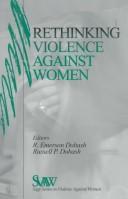
ISBN: 0761911863 0761911871 1452243301 1322420831 1452250553 9781452250557 9781452243306 9780761911869 9780761911876 9781322420837 Year: 1998 Volume: 9 Publisher: Thousand Oaks, Calif. : Sage Publications,
Abstract | Keywords | Export | Availability | Bookmark
 Loading...
Loading...Choose an application
- Reference Manager
- EndNote
- RefWorks (Direct export to RefWorks)
Based on workshops sponsored by the Harry Frank Guggenheim Foundation, recurrent themes in this study of violence against women include: authority, women as sexual property, the assymetry of women, socialisation, patterns and deviations of victims and offenders, personal accounts and socio-cultural contexts.
Women --- Sexual harassment of women --- Family violence --- Wife abuse --- Violence familiale --- Femmes --- Crimes against --- Congresses. --- Social conditions --- Congrès --- Conditions sociales --- Family violence -- Congresses. --- Sexual harassment of women -- Congresses. --- Wife abuse -- Congresses. --- Women -- Crimes against -- Congresses. --- Women -- Social conditions -- Congresses. --- Social Welfare & Social Work --- Social Sciences --- Criminology, Penology & Juvenile Delinquency --- Congresses --- Congrès --- Abuse of wives --- Battering of wives --- Beating of wives --- Wife battering --- Wife beating --- Wives --- Harassment of women, Sexual --- Abuse of --- Spousal abuse --- Abused wives --- Uxoricide
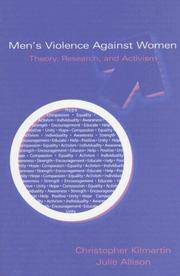
ISBN: 0203937139 1283884593 1135597960 9781135597962 0805857702 9780805857702 0805857710 9780805857719 9780203937136 9781135597917 9781135597955 1135597952 Year: 2007 Publisher: Mahwah, N.J. London Lawrence Erlbaum Associates
Abstract | Keywords | Export | Availability | Bookmark
 Loading...
Loading...Choose an application
- Reference Manager
- EndNote
- RefWorks (Direct export to RefWorks)
This text offers a balance of clinical and social psychological theory and research, as well as prevention and intervention techniques with the purpose of understanding and ultimately ending gender-based violence. The authors address several forms of violence, including rape, intimate partner violence, stalking, and sexual harassment in a contemporary linguistic style carefully crafted to avoid victim blaming. Although most men do not perpetrate violence against women, such violence is not a "women's" issue; it will take the strength and courage of both women and men to solve this human issue.
Abusive men -- Research. --- Mannen. --- Sociale psychologie. --- Violence -- Research. --- Vrouwenmishandeling. --- Women -- Crimes against. --- Women -- Violence against. --- Women --- Violence --- Abusive men --- Social Welfare & Social Work --- Social Sciences --- Criminology, Penology & Juvenile Delinquency --- Abusive boyfriends --- Abusive fathers --- Abusive husbands --- Batterers, Male --- Male batterers --- Men --- Violence research --- Crimes against women --- Femicide --- Women victims of crime --- Human females --- Wimmin --- Woman --- Womon --- Womyn --- Females --- Human beings --- Femininity --- Violence against --- Crimes against --- Research --- Women Violence against --- Violence against. --- Crimes against. --- Research.
Book
ISBN: 1461475317 1461475325 Year: 2013 Publisher: New York : Springer,
Abstract | Keywords | Export | Availability | Bookmark
 Loading...
Loading...Choose an application
- Reference Manager
- EndNote
- RefWorks (Direct export to RefWorks)
Social workers, in whatever capacity they work, can expect to come into contact with women who have experienced/are experiencing violence and with women who are experiencing depression. Therefore, a range of social work supports and interventions are required in order to meet the needs of diverse women and assist them in their recovery. One of these methods is group work where women can share their experiences, learn from each other, reflect on their learnings and identify and achieve changes in their circumstances. This book is based on original research by the author that sought to understand depression in women from a feminist and gender-informed perspective, develop a feminist-based group work response, and highlight the activities of consciousness-raising and resistance as methods for women to achieve change in their lives and in their selves. An innovative and creative group work program, the Women’s Journaling Group Program, was developed from this research and provides a new method of working with women who have experienced/are experiencing violence and mild-moderate depression. The Women’s Journaling Group Program is research-informed, theoretically-grounded, practice-based and feminist and gender-focused. This book, and the program model within it, is an important contribution to the field of critical feminist social work practice.
Depression in women. --- Women -- Crimes against. --- Women -- Mental health. --- Women -- Psychology. --- Social Welfare & Social Work --- Social Sciences --- Social Welfare & Social Work - General --- Family violence. --- Domestic violence --- Household violence --- Interparental violence --- Intrafamily violence --- Depression, Mental, in women --- Social sciences. --- Psychotherapy. --- Social work. --- Counseling. --- Social Sciences. --- Social Work. --- Psychotherapy and Counseling. --- Depression, Mental --- Women --- Violence --- Diseases --- Applied psychology. --- Psychagogy --- Therapy (Psychotherapy) --- Mental illness --- Clinical sociology --- Mental health counseling --- Applied psychology --- Psychology, Practical --- Social psychotechnics --- Psychology --- Benevolent institutions --- Philanthropy --- Relief stations (for the poor) --- Social service agencies --- Social welfare --- Social work --- Human services --- Treatment --- Psychotherapy . --- Counselling --- Helping behavior --- Psychology, Applied --- Interviewing --- Personal coaching --- Social case work
Book
ISBN: 9053567070 9786612401671 128240167X 9048501377 9789048501373 Year: 2009 Publisher: Amsterdam : Amsterdam University Press,
Abstract | Keywords | Export | Availability | Bookmark
 Loading...
Loading...Choose an application
- Reference Manager
- EndNote
- RefWorks (Direct export to RefWorks)
An account of how trafficked women experience and then overcome sexual slavery and trafficking without or in spite of the help offered by outside agencies.
Albanians --France. --- Human smuggling --Albania. --- Human smuggling --France. --- Human trafficking --Albania. --- Human trafficking --France. --- Lyon (France) --Social conditions. --- Prostitutes --France --Lyons. --- Women --Crimes against --France --Lyons. --- Human trafficking --- Human smuggling --- Prostitutes --- Forced prostitution (Human trafficking) --- People trafficking --- Sex trafficking --- Traffic in persons --- Trafficking in human beings --- Trafficking in persons --- Albanians --- Ethnology --- Indo-Europeans --- White slave traffic --- White slavery --- Sex crimes --- Lyon (France) --- Social conditions. --- Lyons (France) --- Lugdunum (France) --- wetenschap algemeen --- popular science --- White slave traffic (Human trafficking) --- White slavery (Human trafficking) --- Offenses against the person --- Lion (France)
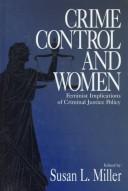
ISBN: 0761907149 0761907130 1452243204 1322420211 1452250480 9781452250489 9781322420219 9780761907145 Year: 1998 Publisher: Thousand Oaks SAGE Publications
Abstract | Keywords | Export | Availability | Bookmark
 Loading...
Loading...Choose an application
- Reference Manager
- EndNote
- RefWorks (Direct export to RefWorks)
Miller's book makes clear the limitations of criminal justice policies which take no account of the effect on citizens who vary by gender, race and social class. Contributors show how desired social change can result from human and just practices.
Criminal justice, Administration of --- Sex discrimination in criminal justice administration --- Female offenders --- Prisoners' spouses --- Women --- Social control --- Feminist theory --- Contrôle social --- THéorie féministe --- Social aspects --- Crimes against --- Criminal justice, Administration of -- Social aspects -- United States. --- Female offenders. --- Female offenders -- United States. --- Feminist criminology. --- Prisoners’ spouses -- United States. --- Sex discrimination in criminal justice administration. --- Sex discrimination in criminal justice administration -- United States. --- Women -- Crimes against -- United States. --- Women prisoners. --- Social Welfare & Social Work --- Social Sciences --- Criminology, Penology & Juvenile Delinquency --- Contrôle social --- THéorie féministe --- Prisoners' wives --- Administration of criminal justice --- Law and legislation --- Justice, Administration of --- Crime --- Criminal law --- Criminals --- Spouses --- Criminal justice [Administration of ] --- United States --- Criminal justice, Administration of - Social aspects - United States. --- Prisoners' spouses - United States.
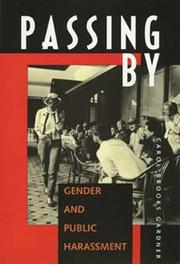
ISBN: 0520916832 0585286019 9780520916838 9780585286013 0520081870 0520202155 9780520202153 Year: 1995 Publisher: Berkeley University of California Press
Abstract | Keywords | Export | Availability | Bookmark
 Loading...
Loading...Choose an application
- Reference Manager
- EndNote
- RefWorks (Direct export to RefWorks)
Catcalls, wolf whistles, verbal slurs, pinches, stalking-virtually every woman has experienced some form of unwanted public attention by men. Off the street, in semi-public places such as restaurants and department stores, women often suffer the insult of being passed over by employees eager to serve men. How pervasive is this behavior? How dangerous can it be? What, if anything, should be done about it?Passing By, an illuminating, unsettling work, explores the important yet little-examined issue of gender-related public harassment. Based on extensive research-including in-depth interviews with nearly five-hundred midwestern women and men-it documents the many types of indignity visited on women in public places. As Carol Brooks Gardner demonstrates, these indignities cross all lines of age, class, and ethnicity and follow a typical pattern whereby a man or men take advantage of a woman's momentary or permanent vulnerability. Beyond describing the scope and variety of harassing behaviors, the book investigates the different ways women and men respond to and interpret them.Gardner concludes, provocatively, that gender-based public harassment exerts a powerful control over women's feelings of comfort in the towns and communities where they live and work. Further, she defines it as a new category of social problem that shares much in common with sexual harassment and, in its more menacing form, requires legal remedy.
Sexual harassment of women --- Invective --- Etiquette --- Women --- Gender Studies & Sexuality --- Gender & Ethnic Studies --- Social Sciences --- Human females --- Wimmin --- Woman --- Womon --- Womyn --- Females --- Human beings --- Femininity --- Ceremonies --- Condolence, Etiquette of --- Manners --- Politeness --- Usages --- Conduct of life --- Manners and customs --- Abuse, Verbal --- Insults --- Insults, Verbal --- Verbal abuse --- Vituperation --- Satire --- Harassment of women, Sexual --- Crimes against --- 305 --- 305 Genderstudies. Rol van de sekse. Gender. Personen vanuit interdisciplinair gezichtspunt --- Genderstudies. Rol van de sekse. Gender. Personen vanuit interdisciplinair gezichtspunt --- Sociology of the family. Sociology of sexuality --- Criminology. Victimology --- Environmental planning --- United States --- Language and languages --- Sexual harassment of women - Indiana - Indianapolis --- Invective - Indiana - Indianapolis --- Etiquette - Indiana - Indianapolis --- Women - Crimes against - Indiana - Indianapolis --- United States of America --- Public spance --- Spatial planning --- Sexual intimidation --- Safety --- Book
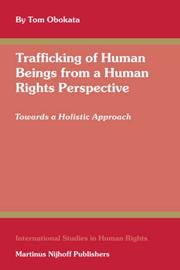
ISBN: 9004154051 9786611400682 1281400688 9047411064 9789004154056 9789047411062 9781281400680 6611400680 Year: 2006 Volume: 89 Publisher: Leiden Martinus Nijhoff Publishers
Abstract | Keywords | Export | Availability | Bookmark
 Loading...
Loading...Choose an application
- Reference Manager
- EndNote
- RefWorks (Direct export to RefWorks)
Trafficking of human beings is a widespread practice in the modern world. It has been estimated that between 600,000 and 800,000 people, the majority of whom are women and children, are trafficked worldwide each year. The rapid growth in trafficking of human beings and its transnational nature have prompted the international community to take urgent action, and a major step was taken when the United Nations adopted the Protocol to Prevent and Suppress Trafficking in Persons, Especially Women and Children (Trafficking Protocol), attached to the United Nations Convention against Transnational Organised Crime (Organised Crime Convention) in December 2000. Yet addressing the human rights aspects of the phenomenon has proven to be difficult in practice, and so far a holistic approach which addresses wider issues surrounding the phenomenon has not been taken. The purpose of this book is to go further than simply recognising that trafficking is a human rights issue. It attempts to establish a human rights framework to analyse and address the act by identifying applicable human rights norms and principles from the beginning to the end of the trafficking process, such as the rights to life, work, health, as well as freedom from torture and slavery. It then articulates key obligations under international human rights law, including the obligations to prohibit trafficking, punish traffickers, protect victims, and to address the causes and the consequences of the practice.
Forced labor --- Women --- Children --- Transnational crime --- Human trafficking --- Victims of crimes --- Human rights --- Prevention --- International cooperation --- Crimes against --- Law and legislation --- Protection --- Law --- Social problems --- International relations. Foreign policy --- Social policy --- Sociology of the family. Sociology of sexuality --- United Nations --- European Union --- Poland --- Thailand --- Great Britain --- Transnational crime. --- Human trafficking. --- Human rights. --- Basic rights --- Civil rights (International law) --- Rights, Human --- Rights of man --- Human security --- Transitional justice --- Truth commissions --- Crime victims --- Victimology --- Victims --- Forced prostitution (Human trafficking) --- People trafficking --- Sex trafficking --- Traffic in persons --- Trafficking in human beings --- Trafficking in persons --- White slave traffic --- White slavery --- Sex crimes --- Multinational crime --- Transborder crime --- Crime --- Crimes against women --- Femicide --- Women victims of crime --- Compulsory labor --- Conscript labor --- Labor, Compulsory --- Labor, Forced --- Employees --- International cooperation. --- Crimes against. --- Protection. --- Forced labor - Prevention - International cooperation --- Women - Crimes against --- Children - Crimes against --- Human trafficking - Law and legislation --- Victims of crimes - Protection --- White slave traffic (Human trafficking) --- White slavery (Human trafficking) --- Offenses against the person --- International --- International organisations --- Government policy --- Legislation --- Book
| Listing 1 - 8 of 8 |
Sort by
|

 Search
Search Feedback
Feedback About UniCat
About UniCat  Help
Help News
News